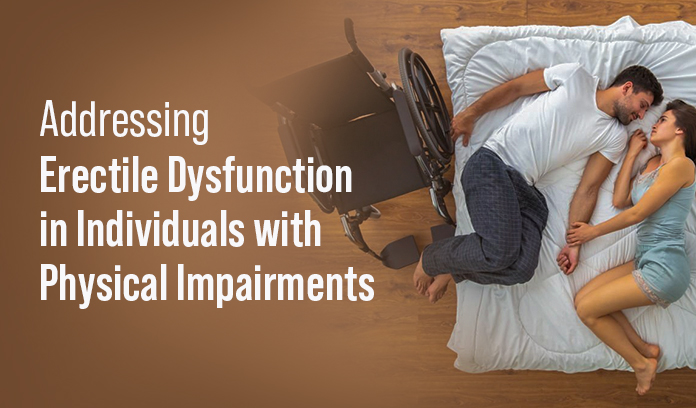Sexuality is an essential component of human life that transcends physical and emotional boundaries. However, individuals dealing with physical impairments may face difficulties when it comes to expressing their sexuality. Among various issues that may encounter, one such can be erectile dysfunction (ED) and it can be distressing.
In this blog, let’s discuss the impact of physical disabilities on sexuality and understand strategies for addressing and overcoming this challenge.
Understanding the Impact of Physical Impairments on Sexuality
Physical impairments encompassed various conditions, from mobility limitations to paralysis. These impairments can have an impact on an individual’s self-esteem, body image, and overall confidence, all of these things play an important role in their sexuality. As a result of these conditions, disabled individuals may experience barriers in forming intimate relationships and find it difficult to express their desires openly. The stigma surrounding disability can also contribute to feelings of inadequacy and lead to difficulties in creating and maintaining romantic relationships.
Addressing Erectile Dysfunction in Disabled Individuals
Erectile dysfunction can affect men of all backgrounds, including those with physical impairments. It is an inability to get or maintain an erection enough for satisfying sexual intercourse. The prevalence of ED in disabled individuals may be higher compared to the general population due to various reasons, such as psychological stress, chronic health issues, and in certain cases the side effects of medications used to manage their disability.
- Open Communication and Empathy:
One of the most critical steps in addressing ED in disabled individuals is creating an environment of open communication and empathy. Healthcare professionals, caregivers, and partners should encourage a supportive environment where disabled individuals feel comfortable discussing their sexual health concerns without any fear of judgment. Encouraging open communication about sexual desires, preferences, and any obstacles faced due to physical impairments can enhance both physical and emotional intimacy.
- Adapted Intimacy and Accessibility:
It is important to understand that sexual intimacy can take many forms beyond traditional intercourse. Disabled people may find alternative ways to express their affection and experience pleasure. Educating partners about adapted intimate techniques can lead to healthy, fulfilling, and enjoyable for both parties involved. Additionally, improving accessibility in physical spaces, sex aids, and assistive devices can help provide more opportunities for sexual exploration and satisfaction.
- Medical Solutions and Professional Support:
Consulting with a healthcare professional who understands the challenges faced by disabled individuals is important in addressing ED. Treatment options such as oral medications, vacuum erection devices, and penile implants may be some viable options for managing ED in some cases. However, personalized treatment plans should be created considering the unique health needs and physical abilities of each person.
Remember, every individual’s experience is unique, and it’s important to approach this topic with sensitivity and respect for the diverse perspectives and challenges faced by disabled individuals in their journey toward sexual fulfillment.

